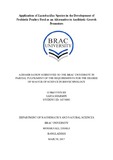Application of lactobacillus species in the development of probiotic poultry feed as an alternative to antibiotic growth promoters
Abstract
The increased use of antibiotics in animal feed for growth promotion may cause antibiotic resistance in animal and humans; due to this, alternative measures are searched to maintain production performance of poultry without the use of antibiotic. One such alternative could be use of probiotics. Probiotics are living organisms which when administered in adequate amounts give a beneficial health effect on its host. One of the most common species known to have probiotic effects are the Lactobacillus species. The objective of this study was to develop probiotic poultry feed using Lactobacillus species which were isolated from the gastrointestinal tract of local healthy chickens. Four isolates of Lactobacillus was obtained from Industrial Microbiology lab, BCSIR. The acid and bile tolerance of the four isolates were investigated at pH of 3, 4, 5 and 6 and salt tolerance at the concentration of 0.5%, 1.0%, 1.5% and 2.0%. The cell surface hydrophobicity was determined using microbial adhesion to hydrocarbon assay with xylene. The antimicrobial activity of the isolates was determined against Salmonella Typhi, E. coli, Shigella, and S. aureus by agar well diffusion method. The isolate nos. 10 and 14 gave more promising results and was grown in large numbers at 37°C in anaerobic condition in a medium formulated at Industrial Microbiology lab. The Lactobacillus cells were then freeze dried to a powder form where skim milk was used as the cryoprotectant and mixed with poultry feed. The viability of the freeze dried probiotic supplement was determined for a period of four months. A field trial was carried out at BLRI where one day old chicks were fed with the probiotic nos. 10 and 14 for a period of five weeks. Results of this study have shown that the isolates had a good tolerance to acidic pH and were tolerant to bile salts. Isolates 10 and 14 showed cell surface hydrophobicity greater than 40%, with 48% and 46% respectively and also showed good antimicrobial activity towards S. typhi, Shigella and S. aureus. Both the probiotic supplement showed good cell counts of log 10 after four months of storage at 4°C. At the end of the field trial, Antibiotic fed chickens showed the maximum weight gain with 1.93% increase followed by chickens fed with probiotic 14 and then 10 with an increase of 1.76% and 0.96% respectively. The control showed the least weight gain. This study concludes that the probiotic supplement developed is quite promising but further field studies are required to give more conclusive results before these can be used to replace antibiotic growth promoters.

